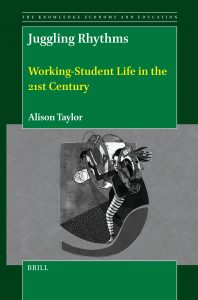Book
Taylor, A. (2025). Jugging rhythms: Working-student life in the 21st century. Brill. https://brill.com/display/title/72365
As in many European countries, the majority of undergraduates in Canada work while studying. However, little research has examined how they juggle school and work. This book draws on original research to address this gap. It moves from students’ day-to-day survival strategies to engage larger questions including how students prepare for volatile labour markets and the effects of the COVID-19 pandemic. Taylor draws on “circus arts” metaphors to argue that twenty-first century skills include the ability to juggle competing demands, to balance studies and various forms of work, and to learn boundaries and the limits of one’s flexibility. Although students’ experiences are diverse, commonalities indicate areas where more attention and support are needed from policy-makers, educators, and scholars of education.
Working Paper
Karim Jamal, S., Taylor, A. & Bobadilla Sandoval, C. (2023, June). International undergraduate students and the employability game. UBC Centre for Migration Studies Working Paper 2023/2 (Editors: A. Ellermann, A. Santos, M. Wright & G. Zhang).
Journal Articles
Mirchandani, K. & Shan, H. (2024). The socially reproductive labour of university students with hostile jobs. Journal of Youth Studies, https://doi.org/10.1080/13676261.2024.2321157
This paper focuses on the socially reproductive labour of one group of young people – university students who hold hostile jobs. Engaging in paid work while studying full-time has become common for university students. Despite the desire for high-quality work integrated learning opportunities, many working undergraduate students face precarious working conditions in service sector jobs. Full-time undergraduate students at two Canadian universities who engaged in term-time paid work participated in focus groups, life mapping, interviews, and audio diaries. The data revealed that more than half of the students experienced hostile work that is characterized by precarious conditions, intensified working pace, erratic scheduling and discrimination. We explore three kinds of social reproductive labour done by young working university students in hostile jobs – the labour of navigating their job conditions, the labour of juggling work and study, and the labour of striving for control and well-being. Our analysis suggests the need to broaden the recognition of the work of working students and to ensure better quality work for young people. Conceptually, the paper is informed by feminist political economy, particularly debates on social reproductive labour.
Taylor, A., Bobadilla Sandoval, C. & Karim Jamal, S. (2023) Dreaming the life: International students and the temporal complexity of employability. Journal of Youth Studies, https://doi.org/10.1080/13676261.2023.2271869
Undergraduates today are required to make strategic decisions about where and what they study, and how they allocate time to studies, extra-curricular activities, and work. International students are likely to experience the pressure to capitalize on their time more intensely because of the high cost of their degree, the work required to acculturate, and the uncertainty of mobility aspirations. Drawing on multi-modal, longitudinal data from a small, diverse group of working international undergraduates at a Canadian university, this article examines how they respond to pressures to be planful, employable and productive. We find that students’ lived experiences contradict idealized discourses of youth mobility. While they feel pressure to make the most of opportunities, the cost of intensive work and constraints on choices are apparent. The effort required to acculturate makes it difficult for such students to be efficient in their use of time. Finally, attempting to keep mobility options open in multiple sites that are constantly changing requires that they invest a significant amount of time and energy. Socio-demographic differences and mobility histories influence students’ ability to choose and their experiences of term-time work, as well as their ideas about what constitutes an appreciable life.
Taylor, A. & Bobadilla Sandoval, C. (2023). Fitting work? Students speak about campus employment. Vocations and Learning, https://doi.org/10.1007/s12186-023-09333-y
Balancing part-time work and studies has become commonplace for university students in Canada and other countries where the costs of education have risen over time. While there is a substantial literature on the impacts of term-time work on studies, little has been written about campus employment programs, which are becoming more commonplace in North American universities. This paper addresses this gap by considering students’ experiences in such a program at a western Canadian university. Focusing primarily on qualitative data from a longitudinal study, we examine the various reasons for the attractiveness of this program, which go beyond the promise of professional, career-related work experience. Our analysis draws on the academic literature on work-study roles, which examines whether termtime work has a more positive or negative effect on student outcomes as well as sociocultural literature that is more attentive to different contextual features of the work-study relationship. We find that university-sponsored jobs are highly valued by students for their workplace relationships, regulation, and flexibility. Positive relationships at work are facilitated by supervisors’ recognition of students’ academic priorities and opportunities to develop peer-support networks on campus. Other important features for students include the convenience of working where one studies, and the ability to build work schedules around academic schedules. However, the limited access to ‘good’ campus jobs raises concerns about equity.
Taylor, A. (2022). ‘Being there’: Rhythmic diversity and working students. Journal of Education and Work, 35(5), 572-584. https://doi.org/10.1080/13639080.2022.2092607
Although universities promote undergraduate degrees as journeys of exploration and reflection, they are also viewed by students as investments in professional careers. This paper draws on a study of 57 second-year students at a research-intensive university in Canada to explore the subjective dimensions of time and school-work rhythms in students’ everyday lives. Data suggest that most students expect to work hard, now and in the future, although their backgrounds influence perceptions of the kind of hard work required, and the magnitude and certainty of returns. Students are future-oriented and participation in term-time work is seen as a way of training for future work lives. This training involves adapting bodies to the temporal logics and rhythms of university studies and workplaces. The interplay of rhythms is experienced by some students as harmonious or ‘eurhythmic’, and by others as discordant or ‘arrhythmic’. The extent of discord is related to differences in students’ work and studies, differences in their time horizons and value calculations, and differences in family background and resources. This paper contends that understanding students’ sense-making in regard to chrono-logics and work-school rhythms is important for building a vision for higher education that better supports human flourishing.
Taylor, A. (2022). Learning to walk the wire: Preparing students for precarious life. British Journal of Sociology of Education, 43(5), 786-803. https://doi.org/10.1080/01425692.2022.2060798
University students today are preparing for a more precarious future than previous generations, and the global pandemic has exacerbated their sense of insecurity and vulnerability. Drawing on data from a longitudinal study of undergraduate students at a large Canadian university, this paper examines the narratives of working students, before and since the pandemic lockdowns began in early 2020. Narratives focus on students’ attempts to handle the diverse rhythms of multiple activities, and how they respond to precariousness in work, family, and academic studies. Findings illustrate intractable tensions within higher education between logics of competition and care, and between access and selectivity. Further, universities, as well as employers, can be seen to contribute to the precarity of students, and to a ‘crisis of care’ in society more generally. Our analysis suggests the need for a more expansive and generous vision for higher education, which recognizes and supports students in their diversity.
Book Chapters
Taylor, A., & Taylor-Neu, R. (2022). Post-secondary education’s chronic problem (or, It’s about time). In A. A. Abdi (Ed.), Social justice education in Canada: Select perspectives. Canadian Scholars Press.
Taylor, A. (in press). Showing up for the rat race: Beyond human capital models of higher education. In A. A. Abdi & G. W. Misiaszek (Eds.), Palgrave handbook on critical theories of education. Palgrave Macmillan.
Taylor, A. (2020). Towards a political economy of education 2.0. In Ali A. Abdi (Ed), Critical theorizations of education (pp. 17-30). Rotterdam: Brill/Sense. DOI: https://doi.org/10.1163/9789004447820_002
Taylor, A. & Raykov, M. (2020). Towards critical and dialogical mixed methods research: Reflections on our journey. In F. Finnegan & B. Grummell (Eds.), Doing critical and creative research in adult education. Rotterdam: Sense Publishing. Open access: https://brill.com/view/book/edcoll/9789004420755/BP000015.xml

